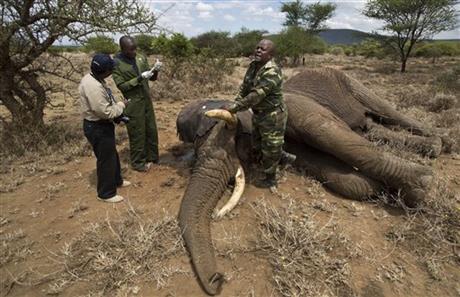
By JASON STRAZIUSO
Street prices for illegal ivory are soaring in China, where newly wealthy middle and upper class citizens are buying carved ivory and whole tusks as a status symbol of their riches, a report released Tuesday found.
The group Save The Elephants said in its report that the wholesale price of raw tusks has tripled since 2010. It said retail prices of ivory have increased by 13 times between 2002 and 2014 in Beijing shops.
Animal conservationists say higher demand for ivory is fueling the elephant killings by poachers across Africa. Save The Elephants said earlier this year that 100,000 elephants were killed in Africa between 2010 and 2012.
Dead elephants are causing increasing grief for China and its diplomatic relations in Africa and the rest of the world. China’s government has said it is trying to curb the illegal trade.
The Chinese basketball star Yao Ming has been enlisted by conservationists to help explain to the Chinese people that buying an ivory trinket results in the death of an elephant in Africa. Conservationists say Chinese buyers often do not understand the connection.
The new report — based on the work of two researchers who traveled to China’s ivory shops — said that nearly four out of five shops in Beijing are illegal. Some ivory sales in China are legal, but conservationists say those legal sales provide cover for the illegal market.
“Every metric on the ivory trade has exploded upwards in recent years. The prices of raw and worked ivory in China, number of licensed carving factories, retail outlets both illegal and legal, items on sale, all have shot up. Meanwhile the weight of ivory seized and number of elephants being killed in Africa have also increased,” the report’s authors, Lucy Vigne and Esmond Martin, said in a statement.
The researchers visited eight ivory-carving factories and found 275 retail outlets in Beijing and Shanghai. They said the vendors reported that more than 90 percent of their customers were Chinese, a change from the mid-190s when most ivory buyers were from Japan, Europe and the U.S.



